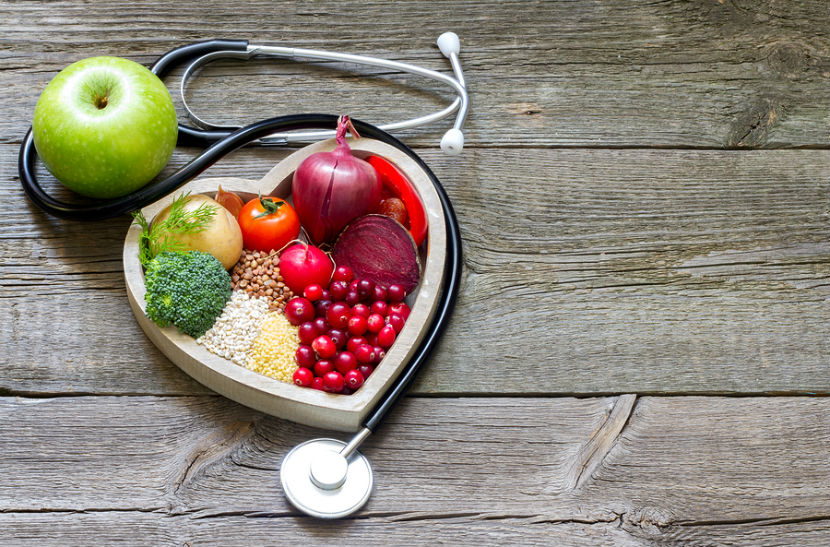
Cholesterol is a fat-like substance that is part of your body’s cells and helps you make vitamin D, bile and certain hormones. However, having high cholesterol levels puts you at higher risk for heart disease. Read on to learn more about blood cholesterol and dietary cholesterol and how to keep your cholesterol levels healthy.
Where does cholesterol come from?
Cholesterol is made in your liver
Your body naturally makes cholesterol in your liver. This is called “blood cholesterol” because it is the cholesterol that circulates in your blood.
Cholesterol comes from food
Cholesterol can come from the foods you eat. This is called “dietary cholesterol” and is found in animal foods like meat, poultry, milk products, eggs, fish and seafood. After you eat, dietary cholesterol circulates in your blood and is stored in your liver.
What are the two types of cholesterol?
-
LDL cholesterol is known as “bad cholesterol”. Too much can lead to plaque build up in your arteries. This can increase the risk of heart disease.
-
HDL cholesterol is known as “good cholesterol”. It helps remove LDL cholesterol from your arteries.
To help lower your risk of heart disease, the goal is to lower LDL cholesterol AND raise HDL cholesterol.
Note: Triglycerides are not a type of cholesterol, they are a type of fat found in your blood. Read this article on triglycerides for more information.
How do you get high cholesterol?
The following risk factors may cause high cholesterol:
-
A family history of high cholesterol
-
A high fat diet, including saturated and trans fats
-
Unhealthy weight
-
Low physical activity
-
High alcohol intake
-
Smoking
-
Some health conditions like diabetes, kidney disease and liver disease
Do you get high cholesterol from eating too much cholesterol in food?
No. Most people do not need to count how much dietary cholesterol they get each day. The amount of cholesterol you get from food usually has little impact on your blood cholesterol.
If you have diabetes, dyslipidemia or heart disease, it is recommended that you eat less dietary cholesterol. Speak to a dietitian or your healthcare provider about how much dietary cholesterol is right for you.
What can I do to prevent or lower high cholesterol levels?
-
Choose protein foods that are lower in saturated fat, like beans, lentils, tofu, fish, nuts, seeds, lean cuts of meat, skinless poultry and lower fat milk and dairy products. Try these delicious Mango Chicken Wraps for a tasty lunch or this Black Bean Couscous for a satisfying salad.
-
Read labels and choose foods with 0 grams of trans fats and avoid foods made with hydrogenated or partially hydrogenated fat. Fried foods, potato chips, donuts, crackers, hard margarines and baked goods are sometimes made with trans fats so always read the label.
-
Choose foods that contain unsaturated fat, like canola or olive oil, avocado, salmon and trout, and unsalted nuts and seeds.
-
Eat more fibre. Aim for at least 25 to 29 grams of fibre per day. Soluble fibre is especially helpful in reducing LDL cholesterol. Eat foods high in soluble fibre everyday. Examples include: oats, oat bran, psyllium, flaxseed, barley, beans, peas, lentils, eggplant, and okra. Eat vegetables and fruit with the peels. Try this Mediterranean Zucchini and Eggplant Dish or this quick and tasty Overnight Apple Pie Oatmeal.
-
Eat a handful (1/4 cup) of unsalted nuts and seeds five or more times a week. Pumpkin, sunflower, sesame, almonds, walnuts and pistachios are great to add to salads, baked goods and main dishes. Try this Sweet and Crunchy Carrot Salad with chopped nuts.
-
Choose foods that contain plant sterols. Plant sterols are naturally found in foods like whole grains, nuts, vegetables, fruit and vegetable oils. You can also find food products enriched with plant sterols. On packaged foods look for the label to say phytosterol, plant sterol or sterol esters.
Are there any diets that help lower cholesterol?
Some diets like the Portfolio Diet, DASH diet and Mediterranean Diet have been found to lower cholesterol. In general, these diets are high in fibre and unsaturated fat and low in saturated fat. If you are interested in changing your diet to help lower your cholesterol, a dietitian can help develop a personalized food plan that translates the science into specific food choices.
Some lifestyle changes can also help you prevent or lower high cholesterol:
-
Manage your weight. Speak to a dietitian or healthcare provider about the weight that is right for you.
-
Move more. Regular exercise improves HDL cholesterol. Adding any amount of activity helps. Try these activities to get into the swing of being active.
-
Quit smoking. Studies have shown that quitting can increase HDL cholesterol. The Smokers’ Helpline has tips and resources to help you get started.
How can a dietitian help?
A dietitian can help you prevent or lower high cholesterol levels by making changes to your diet. Your dietitian will make suggestions on foods to eat and limit based on research and your personal circumstances and goals. They will work with you to make sustainable and realistic goals. Connect with a dietitian today!
Bottom line
There are many ways you can try to maintain healthy cholesterol levels through food. Eating more fibre and less saturated fat are helpful ways to start. If you have diabetes, dyslipidemia or heart disease, you may need to eat less dietary cholesterol. Talk to your dietitian or healthcare provider about dietary cholesterol.
You may also be interested in:
Understanding Eggs and Cholesterol
Facts on Fats
Top 5 Reasons to See a Dietitian
This article was written and reviewed by dietitians from Dietitians of Canada. The advice in this article is intended as general information and should not replace advice given by your dietitian or healthcare provider.
Last Update – November 25, 2022